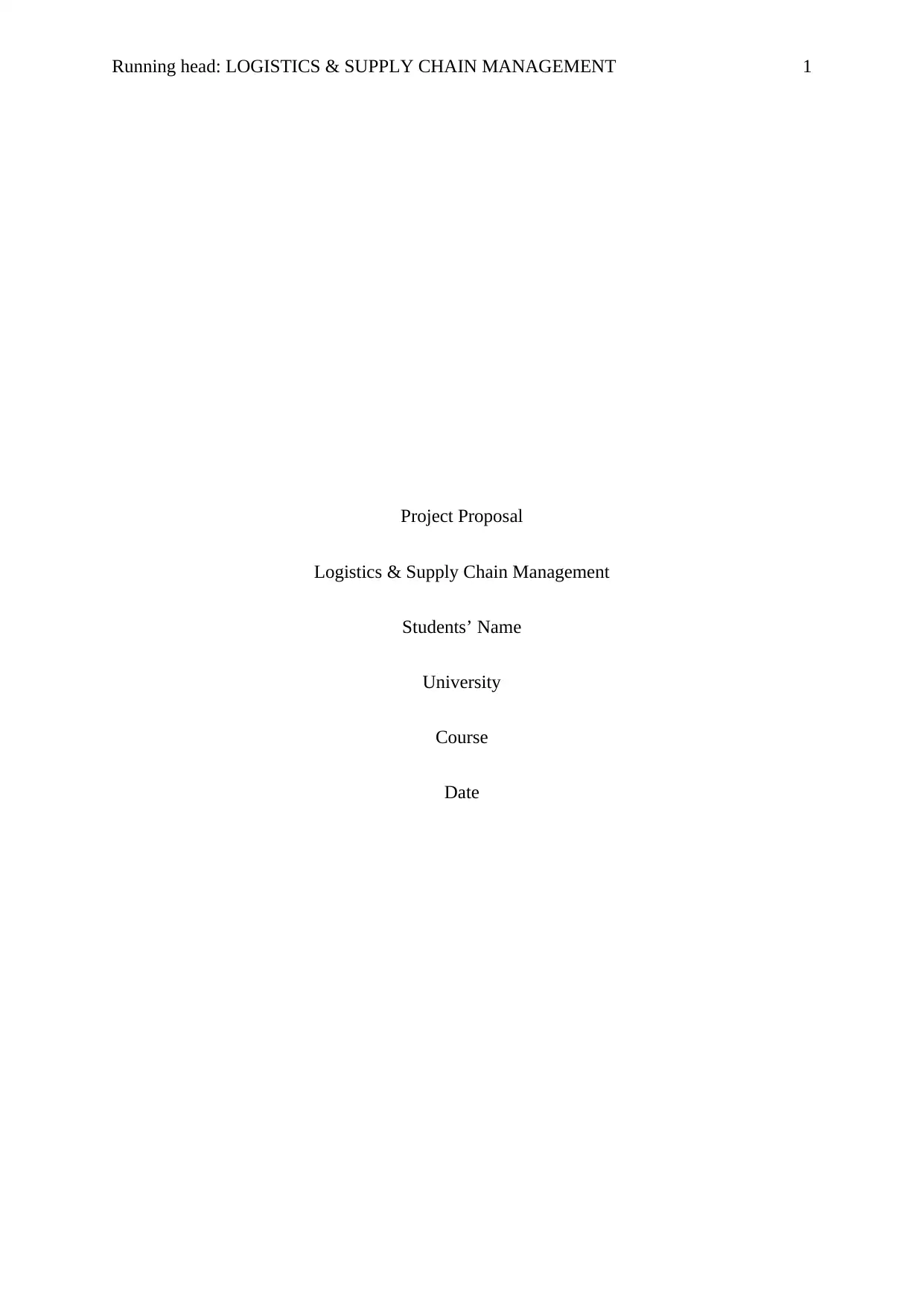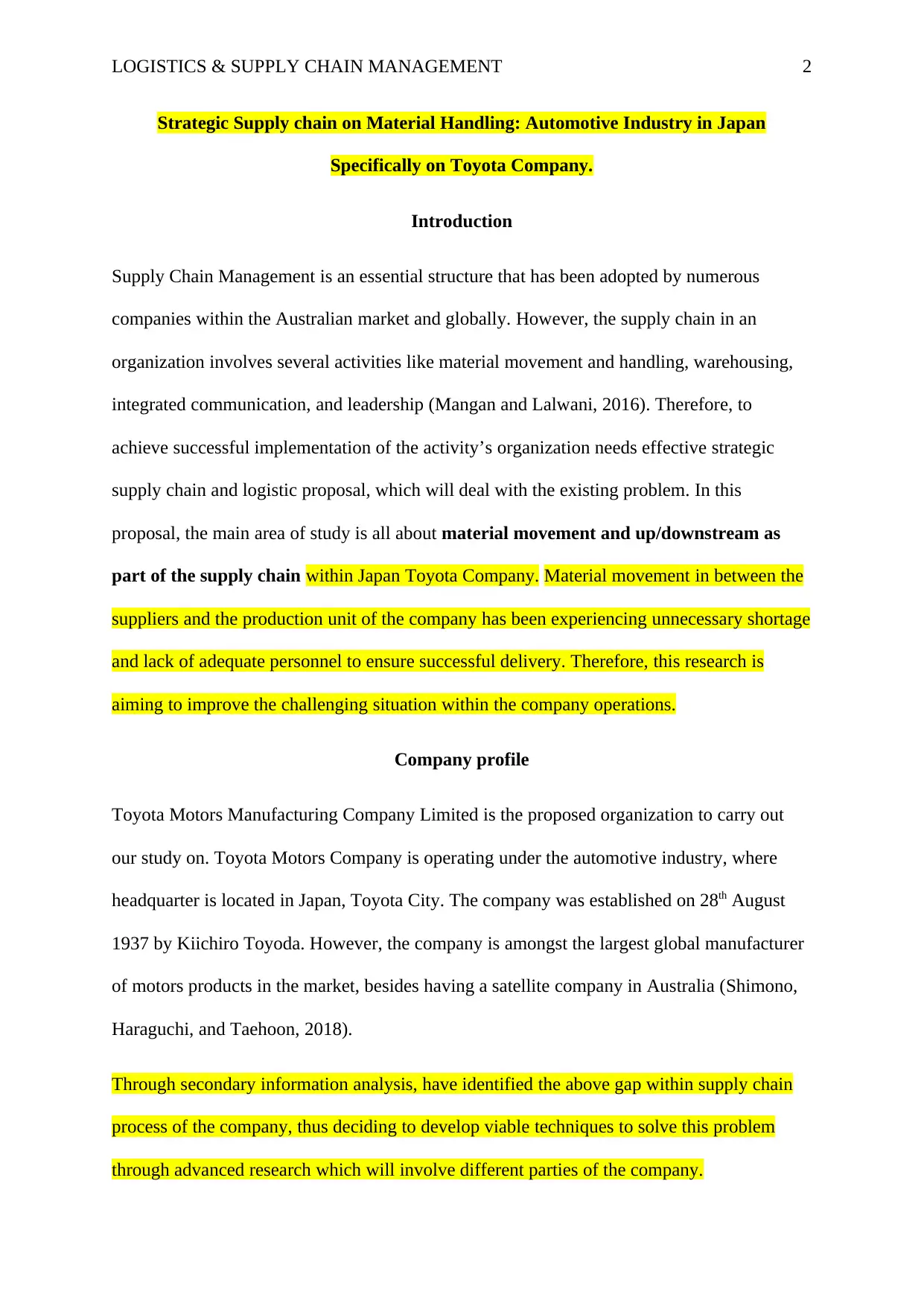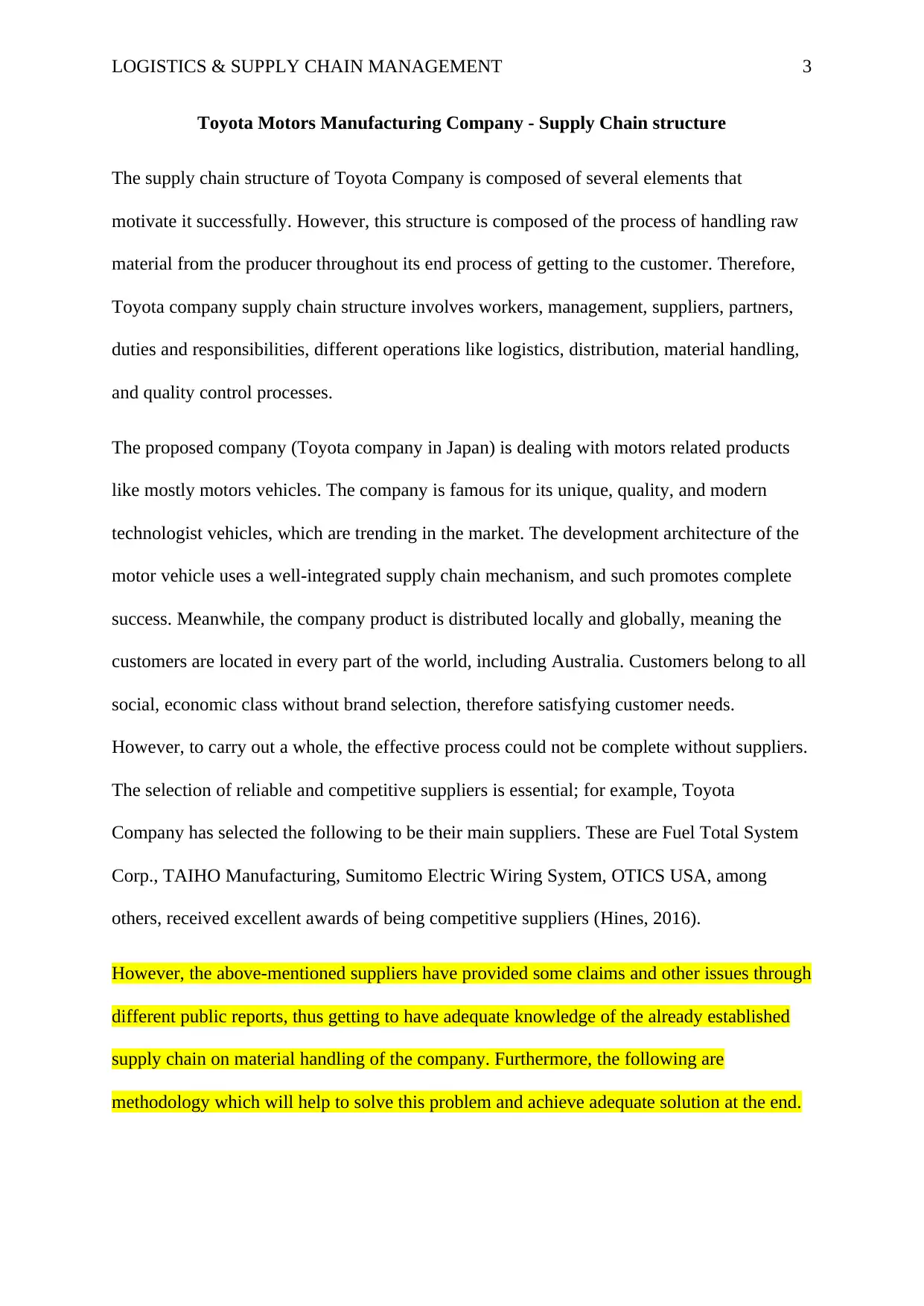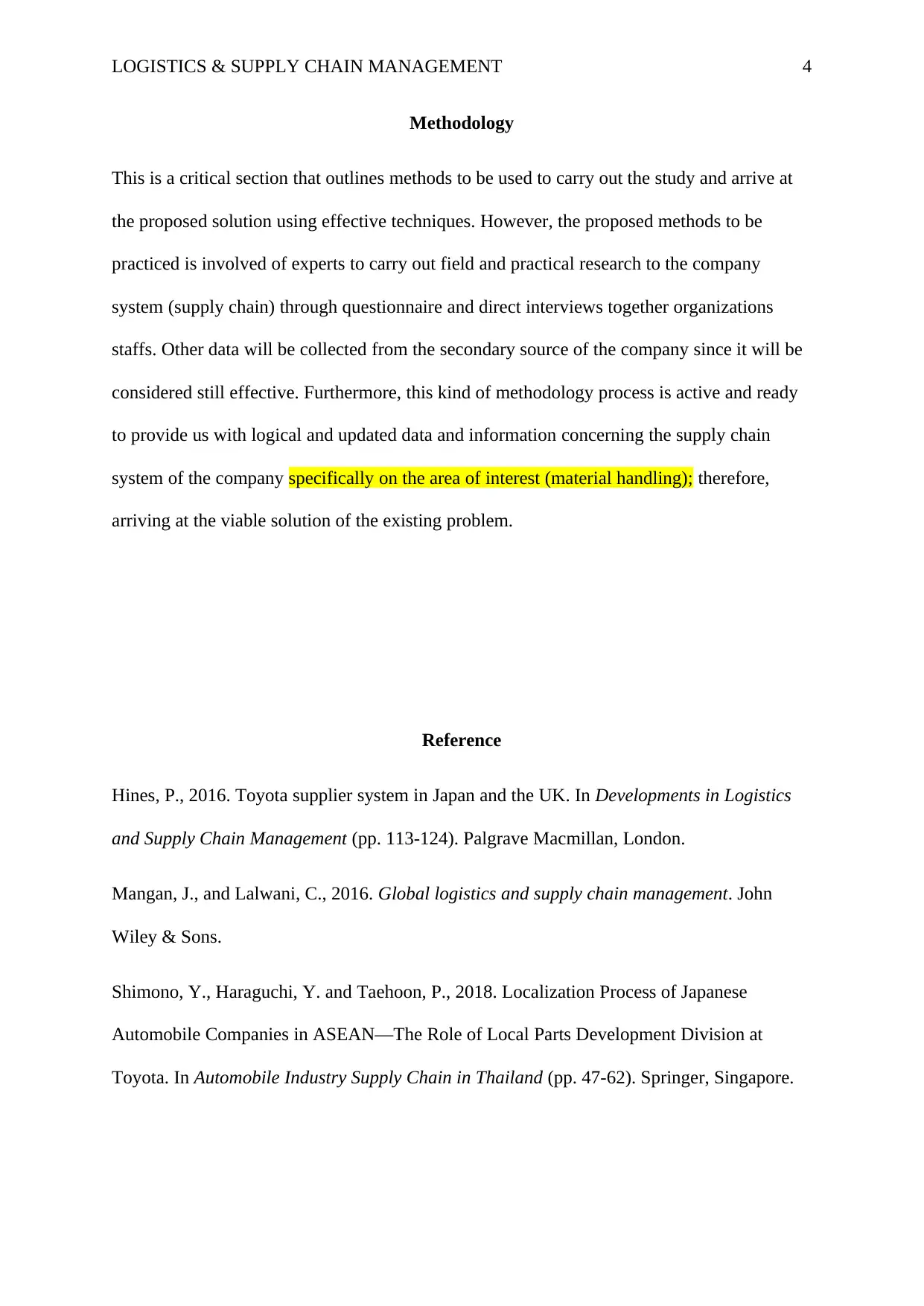Strategic Supply Chain on Material Handling: Toyota Company Project
VerifiedAdded on 2022/09/12
|4
|889
|11
Project
AI Summary
This project proposal focuses on the strategic supply chain management within Toyota's automotive industry, specifically addressing material handling challenges. The introduction highlights the significance of supply chain management and its various components, including material movement, warehousing, and communication. The project aims to improve the existing supply chain issues, such as shortages and personnel gaps, by analyzing Toyota's supply chain structure, which involves suppliers, production units, and customers. The methodology section outlines the research approach, involving expert field research, questionnaires, interviews, and secondary data analysis. The goal is to develop effective solutions for material handling and logistics to enhance operational efficiency within Toyota's supply chain. The project references relevant literature on supply chain management to support its findings and recommendations.

Running head: LOGISTICS & SUPPLY CHAIN MANAGEMENT 1
Project Proposal
Logistics & Supply Chain Management
Students’ Name
University
Course
Date
Project Proposal
Logistics & Supply Chain Management
Students’ Name
University
Course
Date
Paraphrase This Document
Need a fresh take? Get an instant paraphrase of this document with our AI Paraphraser

LOGISTICS & SUPPLY CHAIN MANAGEMENT 2
Strategic Supply chain on Material Handling: Automotive Industry in Japan
Specifically on Toyota Company.
Introduction
Supply Chain Management is an essential structure that has been adopted by numerous
companies within the Australian market and globally. However, the supply chain in an
organization involves several activities like material movement and handling, warehousing,
integrated communication, and leadership (Mangan and Lalwani, 2016). Therefore, to
achieve successful implementation of the activity’s organization needs effective strategic
supply chain and logistic proposal, which will deal with the existing problem. In this
proposal, the main area of study is all about material movement and up/downstream as
part of the supply chain within Japan Toyota Company. Material movement in between the
suppliers and the production unit of the company has been experiencing unnecessary shortage
and lack of adequate personnel to ensure successful delivery. Therefore, this research is
aiming to improve the challenging situation within the company operations.
Company profile
Toyota Motors Manufacturing Company Limited is the proposed organization to carry out
our study on. Toyota Motors Company is operating under the automotive industry, where
headquarter is located in Japan, Toyota City. The company was established on 28th August
1937 by Kiichiro Toyoda. However, the company is amongst the largest global manufacturer
of motors products in the market, besides having a satellite company in Australia (Shimono,
Haraguchi, and Taehoon, 2018).
Through secondary information analysis, have identified the above gap within supply chain
process of the company, thus deciding to develop viable techniques to solve this problem
through advanced research which will involve different parties of the company.
Strategic Supply chain on Material Handling: Automotive Industry in Japan
Specifically on Toyota Company.
Introduction
Supply Chain Management is an essential structure that has been adopted by numerous
companies within the Australian market and globally. However, the supply chain in an
organization involves several activities like material movement and handling, warehousing,
integrated communication, and leadership (Mangan and Lalwani, 2016). Therefore, to
achieve successful implementation of the activity’s organization needs effective strategic
supply chain and logistic proposal, which will deal with the existing problem. In this
proposal, the main area of study is all about material movement and up/downstream as
part of the supply chain within Japan Toyota Company. Material movement in between the
suppliers and the production unit of the company has been experiencing unnecessary shortage
and lack of adequate personnel to ensure successful delivery. Therefore, this research is
aiming to improve the challenging situation within the company operations.
Company profile
Toyota Motors Manufacturing Company Limited is the proposed organization to carry out
our study on. Toyota Motors Company is operating under the automotive industry, where
headquarter is located in Japan, Toyota City. The company was established on 28th August
1937 by Kiichiro Toyoda. However, the company is amongst the largest global manufacturer
of motors products in the market, besides having a satellite company in Australia (Shimono,
Haraguchi, and Taehoon, 2018).
Through secondary information analysis, have identified the above gap within supply chain
process of the company, thus deciding to develop viable techniques to solve this problem
through advanced research which will involve different parties of the company.

LOGISTICS & SUPPLY CHAIN MANAGEMENT 3
Toyota Motors Manufacturing Company - Supply Chain structure
The supply chain structure of Toyota Company is composed of several elements that
motivate it successfully. However, this structure is composed of the process of handling raw
material from the producer throughout its end process of getting to the customer. Therefore,
Toyota company supply chain structure involves workers, management, suppliers, partners,
duties and responsibilities, different operations like logistics, distribution, material handling,
and quality control processes.
The proposed company (Toyota company in Japan) is dealing with motors related products
like mostly motors vehicles. The company is famous for its unique, quality, and modern
technologist vehicles, which are trending in the market. The development architecture of the
motor vehicle uses a well-integrated supply chain mechanism, and such promotes complete
success. Meanwhile, the company product is distributed locally and globally, meaning the
customers are located in every part of the world, including Australia. Customers belong to all
social, economic class without brand selection, therefore satisfying customer needs.
However, to carry out a whole, the effective process could not be complete without suppliers.
The selection of reliable and competitive suppliers is essential; for example, Toyota
Company has selected the following to be their main suppliers. These are Fuel Total System
Corp., TAIHO Manufacturing, Sumitomo Electric Wiring System, OTICS USA, among
others, received excellent awards of being competitive suppliers (Hines, 2016).
However, the above-mentioned suppliers have provided some claims and other issues through
different public reports, thus getting to have adequate knowledge of the already established
supply chain on material handling of the company. Furthermore, the following are
methodology which will help to solve this problem and achieve adequate solution at the end.
Toyota Motors Manufacturing Company - Supply Chain structure
The supply chain structure of Toyota Company is composed of several elements that
motivate it successfully. However, this structure is composed of the process of handling raw
material from the producer throughout its end process of getting to the customer. Therefore,
Toyota company supply chain structure involves workers, management, suppliers, partners,
duties and responsibilities, different operations like logistics, distribution, material handling,
and quality control processes.
The proposed company (Toyota company in Japan) is dealing with motors related products
like mostly motors vehicles. The company is famous for its unique, quality, and modern
technologist vehicles, which are trending in the market. The development architecture of the
motor vehicle uses a well-integrated supply chain mechanism, and such promotes complete
success. Meanwhile, the company product is distributed locally and globally, meaning the
customers are located in every part of the world, including Australia. Customers belong to all
social, economic class without brand selection, therefore satisfying customer needs.
However, to carry out a whole, the effective process could not be complete without suppliers.
The selection of reliable and competitive suppliers is essential; for example, Toyota
Company has selected the following to be their main suppliers. These are Fuel Total System
Corp., TAIHO Manufacturing, Sumitomo Electric Wiring System, OTICS USA, among
others, received excellent awards of being competitive suppliers (Hines, 2016).
However, the above-mentioned suppliers have provided some claims and other issues through
different public reports, thus getting to have adequate knowledge of the already established
supply chain on material handling of the company. Furthermore, the following are
methodology which will help to solve this problem and achieve adequate solution at the end.
⊘ This is a preview!⊘
Do you want full access?
Subscribe today to unlock all pages.

Trusted by 1+ million students worldwide

LOGISTICS & SUPPLY CHAIN MANAGEMENT 4
Methodology
This is a critical section that outlines methods to be used to carry out the study and arrive at
the proposed solution using effective techniques. However, the proposed methods to be
practiced is involved of experts to carry out field and practical research to the company
system (supply chain) through questionnaire and direct interviews together organizations
staffs. Other data will be collected from the secondary source of the company since it will be
considered still effective. Furthermore, this kind of methodology process is active and ready
to provide us with logical and updated data and information concerning the supply chain
system of the company specifically on the area of interest (material handling); therefore,
arriving at the viable solution of the existing problem.
Reference
Hines, P., 2016. Toyota supplier system in Japan and the UK. In Developments in Logistics
and Supply Chain Management (pp. 113-124). Palgrave Macmillan, London.
Mangan, J., and Lalwani, C., 2016. Global logistics and supply chain management. John
Wiley & Sons.
Shimono, Y., Haraguchi, Y. and Taehoon, P., 2018. Localization Process of Japanese
Automobile Companies in ASEAN—The Role of Local Parts Development Division at
Toyota. In Automobile Industry Supply Chain in Thailand (pp. 47-62). Springer, Singapore.
Methodology
This is a critical section that outlines methods to be used to carry out the study and arrive at
the proposed solution using effective techniques. However, the proposed methods to be
practiced is involved of experts to carry out field and practical research to the company
system (supply chain) through questionnaire and direct interviews together organizations
staffs. Other data will be collected from the secondary source of the company since it will be
considered still effective. Furthermore, this kind of methodology process is active and ready
to provide us with logical and updated data and information concerning the supply chain
system of the company specifically on the area of interest (material handling); therefore,
arriving at the viable solution of the existing problem.
Reference
Hines, P., 2016. Toyota supplier system in Japan and the UK. In Developments in Logistics
and Supply Chain Management (pp. 113-124). Palgrave Macmillan, London.
Mangan, J., and Lalwani, C., 2016. Global logistics and supply chain management. John
Wiley & Sons.
Shimono, Y., Haraguchi, Y. and Taehoon, P., 2018. Localization Process of Japanese
Automobile Companies in ASEAN—The Role of Local Parts Development Division at
Toyota. In Automobile Industry Supply Chain in Thailand (pp. 47-62). Springer, Singapore.
1 out of 4
Related Documents
Your All-in-One AI-Powered Toolkit for Academic Success.
+13062052269
info@desklib.com
Available 24*7 on WhatsApp / Email
![[object Object]](/_next/static/media/star-bottom.7253800d.svg)
Unlock your academic potential
Copyright © 2020–2026 A2Z Services. All Rights Reserved. Developed and managed by ZUCOL.





